Month Aviv 1:14, Week 2:6 (Sheshi/Kippur), Year:Day 5938:014 AM
Passover Season Day #1/8, PESACH (Passover): Annual Moed #1
Gregorian Calendar: Sunday 13 April 2014
Pesach 2014
The New Covenant Messianic Evangelical Passover/Pesach Meal
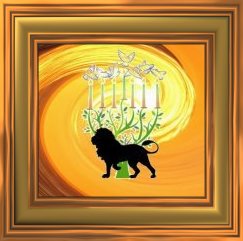 Seventh (2023) Edition [1]
Seventh (2023) Edition [1]
1. Introduction by the Head of the House
1. Shalom in Yah'shua's (Jesus') Name and welcome to this special Passover (Pesach) memorial meal called a Pesach Seder which our Heavenly Father Yahweh-Elohim has commanded that we observe throughout all generations:
"It will come to pass when you come to the land which Yahweh will give you, just as He promised, that you shall keep this service. And it shall be, when your children say to you, 'What do you mean by this service?' that you shall say, 'It is the Pesach (Passover) sacrifice of Yahweh, who passed over the houses of the children of Israel in Egypt when He struck the Egyptians and delivered our households" (Ex.12:25-27, NKJV).
2. Those who obey the Torah or mitzvot (commandments) and trust in Yah'shua the Messiah (Jesus Christ) as their Deliverer (Saviour) (Rev.12:17; 14:12; 22:14) constitute those who are today's Messianic Israel and are therefore commanded to observe this feast and all Yahweh's Moedim or Appointments, of which this is the first.
3. However, we are to celebrate this ancient festival in a new way under the B'rit Chadashah (New Covenant) as instructed by the apostle Paul:
"Purge out the old chametz (leaven), that you may be a new lump, since you truly are unleavened. For indeed Messiah (Christ), our Pesach (Passover), was sacrificed for us. Therefore let us keep the feast, not with old chametz (leaven), nor with the chametz (leaven) of malice and wickedness, but with the matzah (unleavened bread) of sincerity and emet (truth)" (1 Cor.5:7-8, NKJV).
4. In other words we, as believers, are to celebrate Pesach (Passover) with regenerated hearts that come from living a life in Messiah! Why? Because this Feast is all about the Messiah and how His sacrificial blood guards and protects us from all evil so long as we cling to Him. It marks the beginning of a spiritual journey that finds its complection in the final festival of Sukkot which also includes a meal. Thus Yahweh's cycle of appointments begins with a meal - the Pesach (Passover) Meal - and ends with a meal - the Marriage Feast of the Lamb! (Rev.19:19) And in the symbolism of both He is our covering.
5. Our journey begins when we take Yah'shua's (Jesus's) extended hand and invite Him into the gan (garden) of our heart. Once done, He begins to cultivate the wild jungle of our innermost feelings, soothing, calming and healing. At length the wilderness within becomes a garden paradise as we renounce all the lies haSatan (Satan) has taught us and cease living a Torahless (lawless) life of sin which grows up as choking weeds within. With Satan dethroned and Messiah Yah'shua (Christ Jesus) installed on the throne of our innermost being, we begin a process of inner transformation, becoming more and more like our Master. In eating the roast Lamb this evening we symbolise the incorporation of His Nature into our own until eventually, if we persist, we become like Him, which is our ultimate goal.
6. You have all heard or read the story of our Israelite ancestors who were made slaves by a wicked Pharaoh who claimed, just like Yah'shua (Jesus), to be the incarnation of Elohim (God). He represents the Anti-Messiah or Anti-Christ whose Kingdom (Egypt/Babylon) we are commanded in Scripture to free from. He does not, however, let his slaves go easily. And just as there was a show-down between the Creator, Yahweh-Elohim, and the false demonic gods of Egypt so we too must have a show-down with the dark forces that are in our own lives that we have admitted through believing lies about Yahweh and breaking His mitzvot (commandments). No one can escape this. This is one of the other reasons we therefore commemorate Pesach (Passover), to remind us that we must struggle against sin until we have overcome in Messiah.
7. In the same way that we have assembled here this evening in obedience, so we must come to Messiah (Christ) as little children in perfect trust. This is where we begin our journey. And we return to this celebration each year both to encourage those who are new on the journey as well as to complete spiritual battles that we may have failed to win the previous times around. We are here to walk in a spiritual tavnith (pattern) that will ensure we stay on the strait and narrow Derech (Way) that leads to the Kingdom of Yahweh. This we must do if we are to partake of eternal life as Yah'shua (Jesus) said:
"'And behold, I am coming quickly, and My reward is with Me, to give to every one according to his work. I am the Alef (Alpha) and the Taw (Omega), the Beginning and the End, the First and the Last'. Blessed are those who do [Yah'shua's/Jesus'] mitzvot (commandments), that they may have the right to the tree of life, and may enter through the gates into the city" (Rev.22:12-14, NKJV).
8. The original Israelites journeyed to Canaan, the Promised Land - that was their goal. Ours is the Tree of Life in the Heavenly New Jerusalem which shall be returning with Messiah (Christ). In the meantime, we are journeying within and can partake of the Tree of Life within, which is Yah'shua (Jesus). That is why we are here today - to reconsecrate ourselves so that we may have new chayim (life).
2. Lighting the Menorah, Prayer and Worship
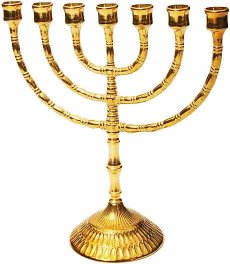
9. We begin our celebration tonight by lighting the Pesach Menorah (Passover Candlearbre):
10. Blessed are You, our Heavenly Father Yahweh-Elohim, through Your Son Yah'shua (Jesus), who has commanded us to observe the feast of Pesach (Passover) during this qodesh (set-apart) season. We invite the Ruach haRishon [2] to enter into our hearts and minds this evening as we honour and remember Your Son Yah'shua (Jesus) who is the Light of the World, and who invites all people everywhere to admit Him to the Thone of their Hearts as King of kings and Master of masters (Rev.19:16), so that we may be covered in divine tavnith (pattern) by our fathers and husbands as we once again prepare to leave the world and the kingdom of darkness.
11. We assemble here to glorify Your Name and to lift that Name up in the praises of our hearts, to worship You in song, in ceremonial observance and in meditation at this set-apart time!
All: Pesach shalom, in Yah'shua's Name,
Ruach haRishon we welcome You again!
The fire of Yah, El Elyon, has come to Kol Beit Yisra'el Again ||
Men: Praise to the Father Yahweh!
Women: Praise to the Father Yahweh!)
All: We lift our hands and hearts to the Throne of Yah,
and worship Yahweh-Elohim! (everyone)
Men: Praise to Yah'shua the Son!
Women: Praise to Yah'shua the Son!
All: We lift our hands and hearts to the Throne of Yah,
and worship Yahweh-Elohim! (everyone)
Men: Praise to the Ruach haQodesh!
Women: Praise to the Ruach haQodesh!
All: We lift our hands and hearts to the Throne of Yah,
and worship Yahweh-Elohim! (everyone)
3. The Seder Display
12. Here are the chief symbols of Pesach (Passover). Scripture mentions three such symbols which are the three ingredients of redemption. These are the foods Yahweh commands us to eat tonight.
13. The first is the Shank Bone of a Lamb and symbolises the lamb eated by the Israelites before they fled Egypt. It represents Yah'shua our Messiah (Jesus Christ) who died for our sins as the Lamb of Elohim (God).
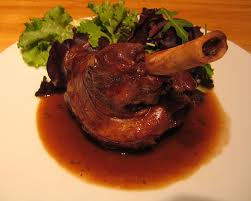
14. The second is Matzah bread. It was made with no yeast or leaven to remind us that the Israelites left Egypt in a hurry and of Yah'shua (Jesus) who is Lechem haChayim or the Bread of Life. The dough that forms the Matzah is ourselves, and the living chametz (yeast), in this context, represents sin. It is absent from the Matzah just as sin was totally absent from the life of Yah'shua (Jesus), whose Body we symbolically eat when we eat this bread, just as it is was removed from our home earlier to remind us that we must get sin out of our lives too. We will be eating this matzah (unleavened bread) today and for the seven days of Chag haMatzah, the Feast of Unleavened Bread, which is prefaced by Pesach (Passover).
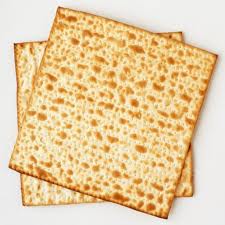
15. Yah'shua (Jesus) said:
"I am Lechem haChayim (the Bread of Life). Your fathers ate the manna in the wilderness, and are dead. This is the lechem (bread) which comes down from the shammayim (heaven), that one may eat of it and not die. I am the living lechem (bread) which came down from the shammayim (heaven). If anyone eats of this lechem (bread), he will live forever; and the lechem (bread) that I shall give is My flesh, which I shall give for the life of the world" (John 6:48-51, NKJV).
16. The third and last food symbol is bitter herbs representing the bitterness of slavery. Living in sin is slavery too which is another reason we need to get it out of our lives and receive in its place the sweetness of Yah'shua's (Jesus') presence.
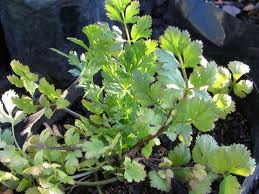
4. The Pesach Meal
17. This set-apart meal is only for baptised believers, small children and those who have made a decision for Messiah as catechumens preparing for baptism.
18. We read in Scripture:
"When the hour had come, [Yah'shua/Jesus] sat down, and the twelve shlichim (apostles) with Him. Then He said to them, 'With tshuka (deep, fervent and sincere desire and longing) I have desired to eat this Pesach (Passover) with you before I suffer; for I say to you, I will no longer eat of it until it is fulfilled in the Malkut Elohim (Kingdom of God).' Then He took the cup, and made the bracha (gave thanks), and said, 'Take this and divide it among yourselves; for I say to you, I will not drink of the p'ri hagefen (fruit of the vine) until the Malkut Elohim (Kingdom of God) comes.' And He took lechem (matzah bread), gave thanks and broke it, and gave it to them, saying, 'This is My Basar (body) [3] which is given for you; do this in zikaron (remembrance) of Me.' [4] Likewise He also took the cup after supper, saying, 'This cup is the B'rit Chadashah (New Covenant) in My blood, which is shed for you'" (Luke 22:14-20, NKJV/OJB).
19. The apostle Paul said:
"For as often as you eat this matzah (bread) and drink this cup, you proclaim the Master's mavet (death) till He comes. Therefore whoever eats this lechem (bread) or drinks this cup of the Master in an unworthy manner will be guilty of the basar (body) and dahm (blood) of the Master. But let a man apply chesbon hanefesh (examine himself), and so let him eat of the bread and drink of the cup. For he who eats and drinks in an unworthy manner eats and drinks judgment to himself, not discerning the Master's basar (body)" (1 Cor.11:26-29, NKJV/OJB).
20. This introduces the fourth and last main symbol of Pesach, namely New Wine or unfermented red grape juice. It represents the atoning blood of our Messiah spilled for us. No one should therefore eat this meal or drink this wine unless they have first examined themselves thoroughly, discerning sins, confessing them, asking for forgiveness and covenanting not to repeat them. No one should eat this meal who does not recognise that he or she is partaking of a sacred ordinance that has spiritual and physical consequences for us. In other words, if he has unresolved sin issues that he is aware of, or if he believes that he is just eating a simple fellowship meal, he should not partake. This ia a divinely sanctioned heavenly meal like the one given by Yahweh to Moses and the Zaqqenim (Elders) on Mt.Sinai at Shavu'ot.
5. Blessing and Drinking the Cup
21. After the blessing of the cup, the wine will be poured. We will drink it together when I instruct you. We have all been called to be freemen and women. We will now bless the wine:
22. Blessed are You, our Heavenly Father Yahweh-Elohim, who has created the fruit of the vine. We now ask You to bless this qadosh (set-apart, holy) wine for all Your people gathered here today as we drink in remembrance of the B'rit Chadashah (New Covenant) in the dahm (blood) of Your Son, which was shed for us on the Cross, that through making teshuvah (repentance) and through emunah (faith) in His Name we might receive forgiveness of sins and the cleansing of our souls. Therefore we drink this cup, Father, as a witness to you that we shall always remember Your Son Yah'shua (Jesus), that we may enjoy a fullness of the Ruach haQodesh (Holy Spirit) to be with us this night and always. Amen.
The wine is poured....
23. Yah'shua said: "Drink from it, all of you. For this is My Dahm haB'rit haChadashah (blood of the New Covenant) [5], which is shed larabbim (for many) for the selicha (forgiveness, remission) of chattaim (sins)" (Matt 26:27-28, NKJV/OJB).
24. You may now drink.
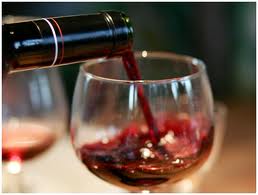
6. Blessing and Eating the Matzah
25. We will now partake of the Matzah as Yah'shua (Jesus) did during the first B'rit Chadashah Pesach (New Covenant Passover):
"And He took matzah (unleavened bread), made the hammotzi (gave thanks) and broke it, and gave it to them, saying, 'This is My Basar (Body) which is given for you; do this in zikaron (remembrance) of Me'" (Luke 22:19, NKJV/OJB).
26. Blessed are You, our Heavenly Father Yahweh-Elohim, who has commanded us to remove the chametz (leaven) of sin from our lives. We ask You to bless and make qodesh (set-apart, holy) this Matzah (Unleavened Bread) for all your people gathered here as we partake of it in remembrance of the Basar (Body) of Your Son, which was broken for us (matzah is broken), as we witness to You that we desire, and are willing, to take upon us the Name of Your Son Yah'shua (Jesus), always rememember Him, always obey your Torah, walk in emunah (faith), emet (truth), ahavah (love) and sacred tavnith (pattern), and keep the covenants we have entered into, or are about to enter into, in baptism. We do this that we may always enjoy a fullness of the Ruach haQodesh (Holy Spirit) as the foundation of our Besorah chayim (Gospel life). Amen.
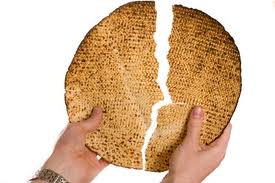
The Matzah is distributed
27. Yah'shua said: "This is My Basar (Body) which is given for you; do this in remembrance of Me" (Luke 22:19, NKJV).
28. You may now eat.
7. Eating the Bitter Herbs
29. We will now partake of the Bitter Herbs which symbolise the bitterness of slavery and the bitterness of sin which separates us from Yahweh. While we eat the Bitter Herbs we also remember the bitterness of the atonement which Yah'shua went through on the cross for our sins.
30. Blessed are You, our Heavenly father Yahweh-Elohim, who has commanded us to eat bitter herbs.
The Bitter Herbs are distributed
31. You may eat the bitter herbs while seated.
Servers prepare and set the Passover Meal on the table
8. Eating the Passover Meal
32. We will now eat the Paschal Lamb meal after the blessing:
33. Blessed are You, our Heavenly Father Yahweh-Elohim, who has ordained that we celebrate Pesach (Passover) as an everlasting memorial. Help us to remember the deliverance of our forefathers from Egyptian bondage, the freedom bought for us by Your Son from sin through His atoning blood, and for the mighty deliverance of Your people Israel out of the world for the Final Gathering that is yet to come. We ask you to bless and set-apart this Lamb which has been prepared in the way You have commanded, and which represents Your Son and our Redeemer, in Yah'shua's (Jesus') Name, Amen.
Passover Meal is eaten
9. Conclusion
34. We now come to the conclusion of our Josephite Passover Haggadah. Let us now go before our Father in Heaven to invoke the blessings of Joseph, our national Israelite head, for the year ahead:
"Mevorekhet (Blessed) of Yahweh is his land,
With the precious things of Shomayim (heaven), with the tal (dew),
And the tehom (deep waters beneath),
With the precious fruits brought forth by the shemesh (sun),
With the precious produce of the yarei'ach (months),
With the best things of the harrei kedem (ancient mountains),
With the precious things of the everlasting hills,
With the precious things of ha'aretz (the earth) and its fullness,
And the favour of Him who dwelt in the [burning] bush.
Let the blessing come 'on the head of Joseph,
And on the crown of the head of him who was separate from his brothers.'
His glory is like the bechor (firstborn) bull,
And his horns like the horns of the wild ox;
Together with them
He shall push the peoples
To the ends of ha'aretz (the earth);
They are the ten thousands of Ephraim,
And they are the thousands of Manasseh."
(Deut.33:13-17, NKJV/OJB).
35. We conclude this assembly by praying for all the Tribes of Israel wherever they may be and for all of us here assembled:
"Yvarekhekha Yahweh v'yismerekha;
Ya'er Yahweh panav eleikha vichunekha,
Yissa Yahweh panav eleikha v'yasem l'kha shalom"
(Num.6:24-26, OJB)
"Yahweh bless you and keep you,
Yahweh make His face shine upon you
And be gracious to you
Yahweh lift up His countenance upon you,
and give you peace"
(Num.6:24-26, NKJV)
36. May you all be filled with the Ruach haRishon today and the fullness of the Ruach haQodesh (Holy Spirit) throughout the days of Chag haMatzah ahead! Amen.
Continued in Part 2 (Pesach Season [6])
Endnotes
[1] With the exception of one item, the Sixth Edition (2014) of the Pesach Haggadah consists almost entirely of cosmetic changes and some added explanatory footnotes for those who wish to study the Haggadah before or afterwards.
The Jewish tradition of striped, pierced matzah has been dropped in favour of unmarked matzah, and whilst this tradition may be a convenient symbolic representation of the pierced and striped body of Messiah, it is nowhere to be found in any instructions on how to observe Pesach in the Tanakh (Old Testament). Rather, the instruction is unambiguous:
"You shall not add to the davar (word) which I command you, nor take anything from it, that you may keep the mitzvot (commandments) of Yahweh your Elohim (God) which I command you" (Deut.4:2, NKJV).
He has not commanded us to stripe (in representation of whipping) or pierce (in representation of the nailing of crucifixion) the matzah, therefore we do not do it.
The cosmetic changes made to this edition consist of additions to Hebrew words and phrases to the prayers and commentaries in order to better approximate the essence of what is being conveyed and to encourage study of the Hebrew language for a better understanding of Scripture.
The Seventh Edition (2023) removes the last of the pagan Greek Symposium traditions associated with the apostate practices of Rabbinic Judaism and sees the tradition of leaning on the left hand while reclining to eat the bread and drink the wine removed, along with references to Judaism's Seder. This brings, we believe, the Passover Meal into complete alignment with the Scriptures.
[2] The first of the sevenfold Ruach haQodesh (Holy Spirit) corresponding to the first festival of the year, Pesach
[3] Exodus 12:8
[4] Leviticus 5:7; 6:23; Ezekiel 43:21; Isaiah 53:8
[5] Isaiah 42:6; Jeremiah 31:31-34)
[6]
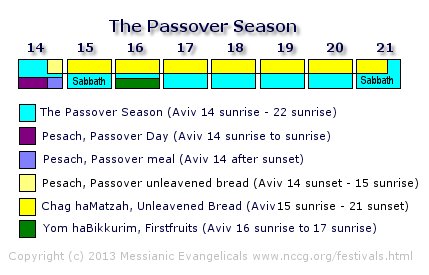

|


